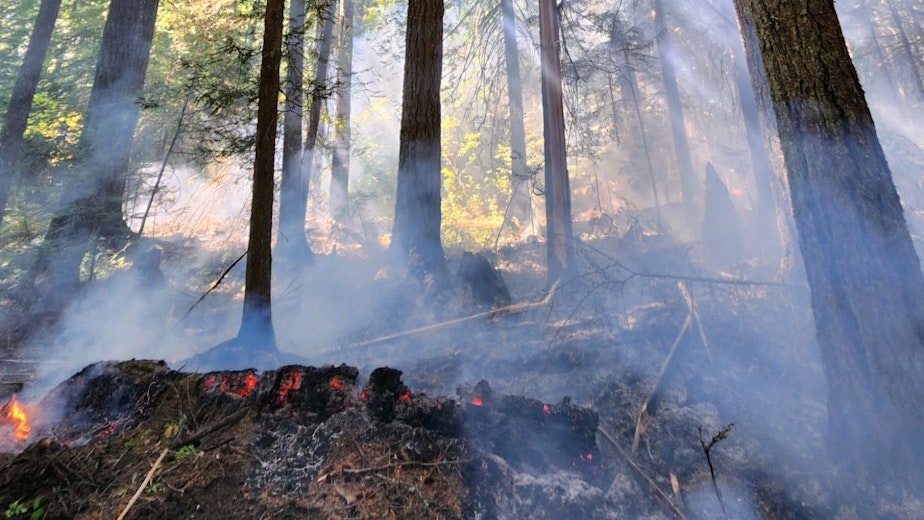As wildfire risk scores rise, WA homeowners are left in insurance limbo

In the last four or five years, it’s become difficult for Gordy Skoog to keep track of the many wildfires that have burned close to his home.
The first was the 2014 Carlton Complex Fire, which damaged or destroyed hundreds of buildings in the Methow Valley. In 2022, he had to evacuate during the Cedar Creek Fire.
"It ran all the way down the valley, and it came within a mile of our place and the backyards of our neighbors in our immediate area," Skoog said. "It's a mad scramble, and you can't grab everything. So, that's the sad part — you know you're leaving behind things that just have a lot of memories."
Until recently, fears of fire have been slightly abated by a homeowner’s policy that includes fire insurance. In the case of a disaster, that insurance would cover the cost of damages to his home and valuables.
But for homeowners like Skoog, who live in the most high-risk fire regions of the state, getting insurance is becoming more difficult. Skoog said he’s now routinely getting notices that his policy isn’t being renewed, despite work he’s done to fire-proof his home, like clearing brush to create a defensible buffer.
Sponsored
Even then, he’s on his third insurer in almost as many years.
"[Insurers are] scrutinizing and squeezing out what they say is high risk," Skoog said. "They're raising the prices such that they're impractical and unaffordable."
After a few rotations on this merry-go-round of coverage, Skoog went to the state’s insurance commissioner with a complaint. He was hoping the office could go to bat for him and make insurance companies take a second look at his home. But he said he’s found little help there.
For the time being, he's been able to find yet another insurer at a reasonable rate. But he’s left to wonder how long he can hang on to the insurance carousel — how long it will be safe to stay in Winthrop long-term.
"It's really disheartening because some people have gotten to the point where they're going to self-insure, even though they don't have enough to do it."
Sponsored
To scope out the danger, insurance companies are turning to a variety of tools that use algorithms to measure and predict wildfire risk. As that risk grows, insurance is becoming harder to come by.
According to a recent Seattle Times recent investigation by journalist Rebecca Moss, a growing number of Washington homeowners are being dropped by their insurance companies due to wildfire risk scoring.
"There are third-party companies that insurance carriers hire to look at various risks factors, and look at either that specific address of property ... or zip codes," Moss told Soundside. "All of these things together then portray risk on a large scale of the community and county state. But because various different models are being used; they're not uniform, and they're often not public."
At present, if someone disagrees with an insurance company's assessment of their property, there are limited tools to challenge the decision. Complaints can be filed with the State Office of the Insurance Commissioner, but the agency has limited authority in the area.
"Outside of the requirement that the company notify you about a policy non-renewal within a certain timeframe, and provide a reason for discontinuing coverage, that reason can be quite general," Moss said. "The Office of the Insurance Commissioner has no power to require an insurer to provide coverage to anyone and providing coverage is at the will of the company."
Sponsored
If insurance can't be found elsewhere, Washington's FAIR plan offers less coverage at a higher premium -- but it's meant to be coverage of last resort.
Other states, like California, have implemented rules requiring more transparency in risk assessments, and also include a right to appeal an insurance determination. Oregon is also requiring more transparency. As of now, Moss said there's no similar legislation on the table in Washington state.
Listen to the full interview by clicking "play" on the audio button above.





